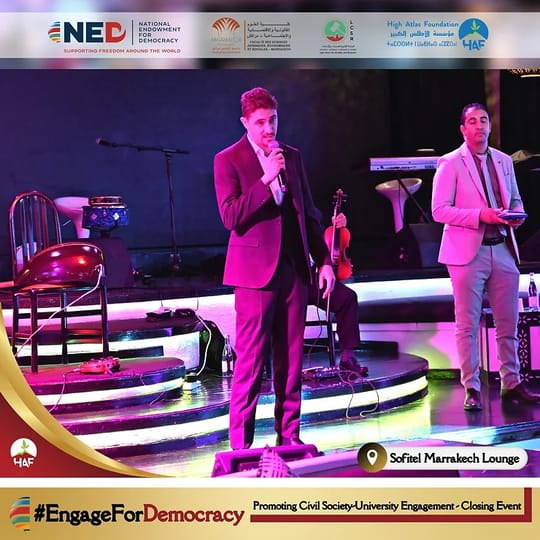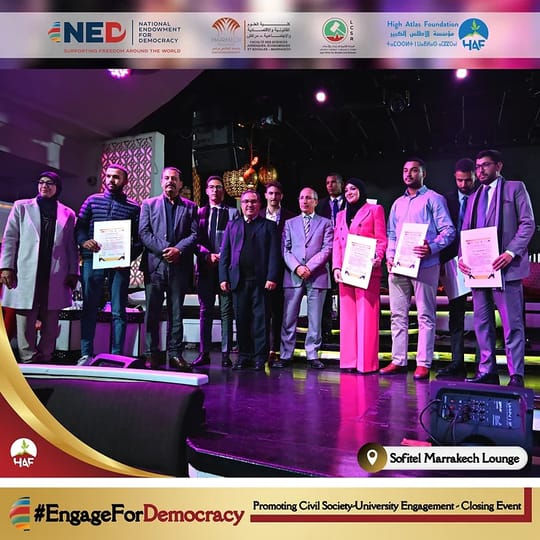'Promoting Civil Society-University Engagement': Transformative Radiance in Marrakech-Safi

The last three hours of the evening on December 28, 2023, witnessed an exceptional event as the Sofitel Hotel hosted the grand closing ceremony of the project "Promoting Civil Society-University Engagement." The High Atlas Foundation (HAF) executed this project through tremendous efforts in collaboration with Cadi Ayyad University and the Legal Clinic for Studies and Research at the Faculty of Legal, Economic, and Social Sciences in Marrakech, funded by the National Endowment for Democracy.
The event honored distinguished participants amidst the presence of high-profile figures, including the President of Cadi Ayyad University, the Dean of the Faculty of Legal, Economic, and Social Sciences, the Director of the Legal Clinic for Studies and Research, representatives of HAF and prominent figures from civil society. The day they have marked a historical moment reaffirming the role of universities and civil society in building a collaborative and interactive community.
The project's journey was filled with achievements, aiming to stimulate collaboration between civil society and universities, focusing on promoting community service learning and enhancing the participation of civil society institutions. These institutions played a pivotal role in launching initiatives that reflected the importance of the university's openness to civil society and engagement in projects contributing to local and societal development. The project targeted over 30 community organizations, including those focusing on supporting individuals with disabilities, and trained 67 students from the legal clinic.
The project stood out by activating the technical capacities of civil society organizations through a training of trainers program. Training days were conducted for more than 30 civil society organizations, covering topics such as training engineering, strategic planning, financial and administrative organization, advocacy strategy, and association participation in public policies. The goal was to achieve and implement advocacy and community awareness initiatives, promoting a partnership model between the university and civil society organizations in the Marrakech-Safi region.
After over two years since the project's inception, the law clinic students successfully provided over 200 legal consultations to marginalized groups. They conducted field visits in vulnerable and mountainous areas in the Marrakech-Safi region, activating 10 mobile legal clinics. This achievement reflects the effective testing of students, who were able to translate their legal knowledge into practical application in the field. This collective effort demonstrates the students' competence in converting their acquired knowledge into tangible legal support and actively contributing through volunteering, aligning with a comprehensive humanitarian concept.
Five (5) self-empowerment workshops were activated during the project period through the "Imagine" program, integrating legal and rights components to encourage more female participation. These empowerment initiatives saw participation from 117 individuals, 92 females and 25 males. The workshops allowed participants to exchange ideas and develop strategies for positive change in a safe and supportive learning environment.
The program emphasizes social stability, emotional intelligence, acceptance of diversity, and creative thinking. These workshops are not just training events but interactive experiences that encourage idea exchange and strategy development for positive societal change.
As a complement to the project, the "Citizenship 101" (MOWATANA101) initiative was launched—an interactive initiative that extended over two months. It involved three-hour weekly sessions, bringing together a selection of civil actors, community leaders, and student researchers.
The "Citizenship 101" (MOWATANA101) initiative provided opportunities for networking, exchanging experiences, and understanding the basics of citizenship and civil participation. It gathered a group of civil actors, community leaders, and student researchers through seven (7) social meetings and training courses on Zoom.
These meetings aimed to enhance a culture of collaborative approach, including advocacy strategies, lobbying, networking, and contributing to the planning and monitoring of local policies, highlighting the importance of public consultation in building open societies.
The academic celebration concluded with the presentation of graduation certificates to the law clinic students and participation certificates in the training of trainers program. Musical performances by the Talented Ensemble added an expressive touch, embodying joy and achievement in this pivotal moment.
In conclusion, the project was not just an initiative but also a transformative journey, bringing positive change to the lives of many individuals. This successful experience highlighted the essential roles of the university and civil society as key contributors to building a society based on collaboration and fruitful interaction.
